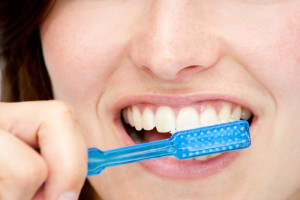Have you ever run your tongue across your teeth and cringed at the sticky, uncomfortable substance that coated their surfaces? Most people are familiar with the feeling of dental plaque, but may not know what the film is or why it forms. In case the uncomfortable feeling isn’t enough to prompt good dental hygiene habits, we explain the dangers that dental plaque buildup can pose to your overall oral health, and why preventive dentistry is necessary to control it.
The Anatomy of Dental Plaque
Aside from your teeth, gums, and tongue, your mouth also contains about 600 different identifiable kinds of bacteria, which form dental plaque to protect themselves from your body’s immune efforts. Luckily, most of these germs are harmless, and may even be critical to your mouth’s delicate ecological balance. However, the malicious germs that reside in your mouth are responsible for a number of destructive oral health issues, such as tooth decay and gum disease.
Destructive Oral Bacteria
These harmful microbes are the reason why dental plaque is a danger to your oral health. For instance, the bacterial species Streptococcus mutans, consumes the sugars and starches in your meal and converts them into lactic acid, which depletes your teeth of essential minerals. Since tooth enamel, which surrounds and protects your teeth, is your body’s most mineralized substance, the mineral depletion severely weakens your enamel and can leave your tooth vulnerable to infection and tooth decay.
Meanwhile, the germ Porphyromonas gingivalis, which also contributes to plaque formation, can manipulate your immune system’s inflammatory response, leading to excessive inflammation of your gingival tissues (gums). Left unchecked, P. gingivalis infection can progress into gum disease and threaten your smile’s entire foundation.
The Importance of Preventive Dentistry
The bulk of dental plaque control lies in your hygiene routine at home, including brushing and flossing your teeth at least twice a day, every day. Complete control, however, requires routine preventive dentistry visits, such as dental cleanings and checkups, to ensure that plaque and its calcified form, tartar, don’t remain on your teeth too long. By keeping plaque in check, you greatly reduce your risks of developing tooth decay, gum disease, chronic bad breath, and more.


